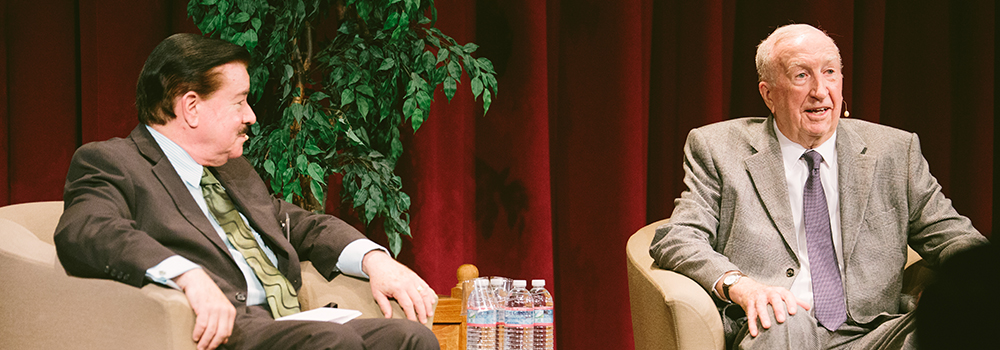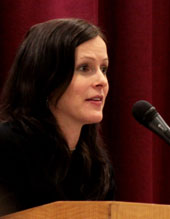
- February 24, 2025: Len Jui
- March 7, 2024: Kim Mendoza '08
- January 24, 2024: Peter Kaufman
- April 25, 2023: Richard Brookbanks
- December 6, 2022: Sara Mijares Del Fium '03
- April 28, 2022: Martin Biegelman
- December 6, 2021: Ash Noah
- April 21, 2021: Tim Hedley
- October 23, 2019: Andrea Schulz
- February 19, 2019: Susan Maples
- November 15, 2018: Toby Groves
- February 15, 2018: Charles Swenson
- February 22, 2017: Daniel O'Leary
- October 19, 2016: Ruth McCartney
- February 18, 2016: Paul H. Stebbins
- October 28, 2015: Gary Cokins
- February 9, 2015: Anthony Leiserowitz
- October 21, 2014: J.D. Power
- October 8, 2013: Leslie Seidman
- March 19, 2013: Aaron Beam
- October 15, 2012: Joshua D. Rauh
- January 31, 2012: Diana B. Henriques
- February 22, 2011: Bethany McLean
Artificial intelligence, blockchain, data analytics, machine learning, and robotic process automation are trending buzzwords at the moment, but what do they mean for auditors and accountants? Andrea Schulz, an audit senior manager in KPMG’s Silicon Valley Office, explored the emerging technologies that are poised to transform the profession in her talk titled "Innovating the Future of Audit."
Susan Maples, CPA, the Franchise Tax Board's Taxpayers' Rights Advocate, discussed the current state of California taxation and provided a brief glimpse into the past when Californians filed stand-alone tax returns. Since then, there have been many changes in California and federal tax laws for both individuals and business entities; and, now with the Tax Cut and Jobs Act, California income tax laws are once again considerably different from federal law. Ms. Maples shared her perspective on these changes and how they may affect you.
Dr. Toby Groves discussed a revolutionary approach to skepticism that enhances professional reasoning and judgment as well as the surprising psychology and invisible influences that impact skeptical judgment. Attendees learned how judgment can be refined by turning the lens of skepticism back on yourself, recognizing and adapting your approach to achieve the best results.
Charles Swenson - Feb. 15, 2018
Charles Swenson, USC Professor of Accounting, spoke about the Tax Cuts and Jobs Act of 2017 which was the most significant change in federal income tax laws since 1986. He summarized the tax law changes and discussed how these changes affect all taxpayers - business, individuals and estates and trusts. Swenson noted that it is generally a tax cut but some taxpayers will experience tax increases. The changes leave uncertainty because regulations are in process and it is unclear if states will adopt the changes as well.
Daniel O'Leary - Feb. 22, 2017
Daniel O'Leary, USC Professor of Accounting, is an expert on artificial intelligence in business, social networking, e-business and knowledge management. His lecture examined big data, the sources of big data and the impact of big data on privacy and ethics.
Ruth McCartney - Oct. 19, 2016
Big Data is having a big moment. More than 90% of the data in the world was created in just the last two years. It's cutting billions in energy costs, decoding DNA to find cures and anticipating hurricanes. Big Data predicted the Zika virus and the Ebola outbreak. It even predicted the winner of the 2012 presidential election. Ruth shared numerous examples of how Big Data is impacting our everyday lives through the use of retail rewards cards, online purchases, airline loyalty programs, store foot traffic and food consumption patterns.
Paul H. Stebbins - Feb. 18, 2016
With the United States' national debt at a post-World War II high, Paul Stebbins, chairman emeritus of World Fuel Services Corporation, spoke about "Fixing the Debt – Our American Experiment at Risk."
At a time when the U.S. debt is twice the historical average and we are projected to add another $8 trillion over the next decade, Mr. Stebbins shared his insights on how we got here and what we can do to fix it.
Gary Cokins, an expert on performance improvement systems and advanced cost management, presented "Analytics-Based Performance Management – Making It Work." Most companies are far from where they want and need to be when it comes to implementing analytics and are still relying on gut feeling, rather than hard data, when making decisions. Gary discussed how analytics can be incorporated into various business methods to improve an organization's strategic and operational performance.
Anthony Leiserowitz - Feb. 9, 2015
Dr. Leiserowitz is an expert on public opinion and engagement with the issues of climate change and the environment. He spoke to LMU students, alumni, faculty and staff on February 9th as part of the College of Business Administration's Paul A. Grosch Lecture Series where he shared recent trends in Americans' climate change knowledge, attitudes, policy support and behavior, as well as discussed strategies for more effective public engagement.
The CBA was fortunate to have business icon J.D. "Dave" Power grace the Hilton stage for the second time in the last five years. Moderated by President's Professor of Marketing David Stewart, Mr. Power had an intimate hour-long chat with the LMU business community about starting J.D. Power and Associates from his kitchen table and the lessons he's learned over the years.
Leslie Seidman, former chairman of the Financial Accounting Standards Board (FASB), presented a lecture titled "Setting Standards" in which she discussed how the FASB sets standards, the political pressures FASB members confront, and convergence efforts with the International Accounting Standards Board (IASB).
Aaron Beam, co-founder and former CFO of HealthSouth, presented a lecture titled "Ethics First," centered on the lessons learned from the $2 billion HealthSouth accounting scandal. He described the internal forces within HealthSouth that led to an overstatement of the company's earnings by nearly $2 billion. Additionally, Beam explained with brutal honesty how the fraud was perpetuated, emphasizing the ethical lessons that students should learn from it.
Joshua D. Rauh - Oct. 15, 2012
In a lecture, titled "Cities and States in Crisis," Joshua D. Rauh, professor of finance at Stanford University, spoke about the current and future financial crisis faced by many state and municipal governments, with specific emphasis on future revenue demands that will be made by public pension obligations. He estimated that state and local governments presently have over $4.4 trillion in unfunded pension obligations, about $35,000 for each American household. Rauh explained how this situation developed, how pension laws have contributed to the problem and how accounting standards have masked the extent of the problem. He also addressed how this will affect citizens of California and proposed some solutions.
Diana B. Henriques - Jan. 31, 2012
Diana Henriques is an award-winning financial journalist at The New York Times and bestselling author of "The Wizard of Lies - Bernie Madoff and the Death of Trust." She specializes in investigative reporting on white-collar crime, market regulation and corporate governance. Her lecture - presented in front of a packed Hilton Auditorium - focused on the topic: "What We Should Learn from Bernie Madoff."
Bethany McLean - Feb. 22, 2011

In February 2011, the LMU Department of Accounting held its inaugural Paul A. Grosch Lecture Series with the 2008 financial crisis as its theme. The event educated students on the consequences of human error and recounted what factors led to the inevitable collapse of the global financial sector.